Latest Sheet Music
Ryuichi Sakamoto

Ryuichi Sakamoto (坂本 龍一 Sakamoto Ryūichi?, born January 17, 1952) is an Academy Award-, Grammy-, and Golden Globe-winning Japanese musician, composer, record producer and actor, based in New York and Tokyo. He played keyboards in the influential Japanese electropop band Yellow Magic Orchestra. His 1999 musical composition "Energy Flow" is the first number-one instrumental single in the Japan's Oricon charts history. He was ranked at number 59 in a list of the top 100 most influential musicians compiled by HMV Japan.
Brenton Brown

Brenton Gifford Brown (born 1 July 1973) is a dual South African and American Christian musician and worship leader. The title track "Everlasting God" on his solo album, Everlasting God was given an award at the ASCAP awards ceremony in 2008. Brenton Brown co-wrote "Soul on Fire", released by Third Day was nominated for a Grammy award after spending 11 weeks at No. 1 on the Christian Airplay charts. In 2019 Brown's song, "You Know My Name", co-written with Tasha Cobbs Leonard, reached No. 1 on the Billboard Gospel chart and was nominated for a Stellar Award.
Hoàng Vân
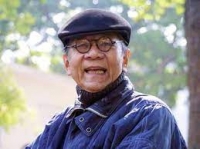
Hoàng Vân (24 July 1930, Hanoi – 4 February 2018) is a Vietnamese songwriter and composer. He was a recipient of the Hồ Chí Minh Prize in 2000.Hoàng Vân is one of the best famous Vietnamese composers from the '60s and his songs are still very popular until today. Among the most sung we can mention:
Tram tu Thieng
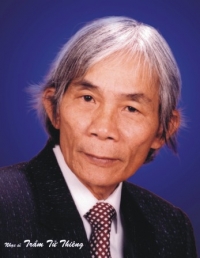
Tram Tu Thieng (October 1, 1937 - January 25, 2000) was a typical gold musician in South Vietnam before 1975 and later overseas. He also writes children's music under the pen name Anh Nam.
James Scott

James Sylvester Scott (February 12, 1885 – August 30, 1938) was an African-American ragtime composer, regarded as one of the three most important composers of classic ragtime, along with Scott Joplin and Joseph Lamb.
He was born in Neosho, Missouri to James Scott Sr. and Molly Thomas Scott, both former slaves. In 1901 his family moved to Carthage, Missouri, where he attended Lincoln High School. In 1902 he began working at the music store of Charles L. Dumars, first at menial labor, but before long demonstrating music at the piano, including his own pieces. Demand for his music convinced Dumars to print the first of Scott's published compositions, "A Summer Breeze", in 1903.
In 1906 he moved to St. Louis, Missouri, where Scott Joplin introduced him to publisher John Stillwell Stark. The first Scott rag that Stark published, 'Frog Legs Rag', became a hit, and Scott became a regular contributor to the Stark catalogue. In 1914 Scott moved to Kansas City, Missouri, where he married Nora Johnson, taught music, and accompanied silent movies.
He was born in Neosho, Missouri to James Scott Sr. and Molly Thomas Scott, both former slaves. In 1901 his family moved to Carthage, Missouri, where he attended Lincoln High School. In 1902 he began working at the music store of Charles L. Dumars, first at menial labor, but before long demonstrating music at the piano, including his own pieces. Demand for his music convinced Dumars to print the first of Scott's published compositions, "A Summer Breeze", in 1903.
In 1906 he moved to St. Louis, Missouri, where Scott Joplin introduced him to publisher John Stillwell Stark. The first Scott rag that Stark published, 'Frog Legs Rag', became a hit, and Scott became a regular contributor to the Stark catalogue. In 1914 Scott moved to Kansas City, Missouri, where he married Nora Johnson, taught music, and accompanied silent movies.
Speelklaar
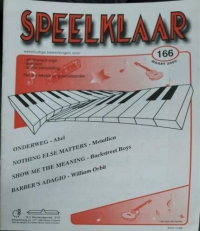
Ready to Play- Easy Piano and Keyboard Edits - Music Score. Fast and reliable worldwide.
Edmund Abesser
Edmund Alexander Abesser (* 13. Januar 1837 in Marktgölitz; † 15. Juli 1889 in Wien) war ein deutscher Musiker, Musikpädagoge, Komponist und Pianist.Edmund Abesser erhielt seinen ersten Musikunterricht bei deinem. Dieser unterrichtete ihn auf dem Klavier, an der Orgel und in Harmonielehre. Zu seiner Aufnahmeprüfung am Konservatorium legte Edmund schon 60 Compositionen vor. Private studierte vom 4. Oktober 1854 bis zum 29. September 1857 am Leipziger Conservatory. Seine Klavierlehrer waren Ignaz Moscheles and Louis Plaidy. Seine Lehrer in Musiktheorie waren Ernst Friedrich Richter und Moritz Hauptmann. Er erhielt 1856 ein Stipendium für unbemittelte, fleißige und begabte Schüler und Schülerinnen. Nach seinem Studium wurde er Hofpianist in Meiningen. Er lebte die meiste Zeit seines Lebens in Meiningen und Leipzig. In Leipzig wirkte er als Salonpianist, Komponist und Klavierlehrer. In den 1870ern unterrichtete er an der Akademie für Tonkunst in Leipzig. Unter seinen Schüler war der Sänger, Komponist und Musiklehrer Eugen Lindner (* 11. Dezember 1858; † 12. November 1915), der ab 1913 am Leipziger Konservatorium unterrichtete
Traditional

Benjamin Ipavec

Benjamin Ipavec (24 December 1829 – 20 December 1908) was one of the foremost Slovene Romantic composers. A native of Šentjur, he lived in that town for much of his life. He was a physician in his professional life; as a composer he wrote mainly small choral pieces for amateur forces. He wrote the first Slovene operetta, titled Tičnik . His brother Gustav and nephew Josip were both active as physicians and composers as well. Ipavec died in Graz on 20 December 1908 and he was buried there two days later.
Yann Tiersen

Guillaume Yann Tiersen (born 23 June 1970) is a French musician and composer known internationally for composing the score to the Jean-Pierre Jeunet movie Amélie. His music is recognized by its use of a large variety of instruments in relatively minimalist compositions, often with a touch of either European classical music or French folk music, using primarily the piano, accordion or violin together with instruments like the melodica, xylophone, toy piano, ondes martenot, harpsichord and typewriter. His musical style is reminiscent of Frédéric Chopin, Erik Satie, Philip Glass and Michael Nyman.
Handel

George Frideric Handel (Friday, 23 February 1685 - Saturday, 14 April 1759) was a German-born Baroque composer who is famous for his operas, oratorios and concerti grossi. Born as Georg Friedrich Handel in Halle, he spent most of his adult life in England, becoming a subject of the British crown on 22 January 1727. His most famous works are Messiah, an oratorio set to texts from the King James Bible; Water Music; and Music for the Royal Fireworks. Strongly influenced by the techniques of the great composers of the Italian Baroque and the English composer Henry Purcell, his music was known to many significant composers who came after him, including Haydn, Mozart, and Beethoven.
Handel's compositions include 42 operas; 29 oratorios; more than 120 cantatas, trios and duets; numerous arias; chamber music; a large number of ecumenical pieces; odes and serenatas; and sixteen organ concerti. His most famous work, the Messiah oratorio with its "Hallelujah" chorus, is among the most popular works in choral music and has become a centerpiece of the Christmas season. Also popular are the Opus 3 and 6 Concerti Grossi, as well as "The Cuckoo and the Nightingale", in which birds are heard calling during passages played in different keys representing the vocal ranges of two birds. Also notable are his sixteen keyboard suites, especially The Harmonious Blacksmith.
Handel introduced various previously uncommon musical instruments in his works: the viola d'amore and violetta marina (Orlando), the lute (Ode for St. Cecilia's Day), three trombones (Saul), clarinets or small high cornets (Tamerlano), theorbo, French horn (Water Music), lyrichord, double bassoon, viola da gamba, bell chimes, positive organ, and harp (Giulio Cesare, Alexander's Feast).
Handel's compositions include 42 operas; 29 oratorios; more than 120 cantatas, trios and duets; numerous arias; chamber music; a large number of ecumenical pieces; odes and serenatas; and sixteen organ concerti. His most famous work, the Messiah oratorio with its "Hallelujah" chorus, is among the most popular works in choral music and has become a centerpiece of the Christmas season. Also popular are the Opus 3 and 6 Concerti Grossi, as well as "The Cuckoo and the Nightingale", in which birds are heard calling during passages played in different keys representing the vocal ranges of two birds. Also notable are his sixteen keyboard suites, especially The Harmonious Blacksmith.
Handel introduced various previously uncommon musical instruments in his works: the viola d'amore and violetta marina (Orlando), the lute (Ode for St. Cecilia's Day), three trombones (Saul), clarinets or small high cornets (Tamerlano), theorbo, French horn (Water Music), lyrichord, double bassoon, viola da gamba, bell chimes, positive organ, and harp (Giulio Cesare, Alexander's Feast).
The Sound of Music

The Sound of Music is a musical with music by Richard Rodgers, lyrics by Oscar Hammerstein II, and a book by Howard Lindsay and Russel Crouse. It is based on the memoir of Maria von Trapp, The Story of the Trapp Family Singers. Songs from the musical that have become standards include "The Sound of Music", "Edelweiss", "My Favorite Things", "Climb Ev'ry Mountain", and "Do-Re-Mi".
The original Broadway production opened in November 1959, and the show has enjoyed numerous productions and revivals since then. It has also been made into an Academy Award-winning 1965 movie musical. The Sound of Music was the final musical written by Rodgers and Hammerstein; Hammerstein died of cancer nine months after the Broadway premiere.
The original Broadway production opened in November 1959, and the show has enjoyed numerous productions and revivals since then. It has also been made into an Academy Award-winning 1965 movie musical. The Sound of Music was the final musical written by Rodgers and Hammerstein; Hammerstein died of cancer nine months after the Broadway premiere.
The Music Tech Dictionary

The Music Tech Dictionary" provides the definitive glossary of music technology and pro audio topics and terms. It focuses on the terminology, techniques, and formats that are common in the audio and music technology field, and offers concise, pithy explanations of what each term represents. Users will be able to look up any music software, music technology, or audio related term they run across in their software, in articles, or in studios, for a short, complete overview.
Andrew Gold

Andrew Maurice Gold (August 2, 1951 – June 3, 2011) was an American multi-instrumentalist, singer, songwriter, and record producer who influenced much of the sound of Los Angeles-dominated pop rock in the 1970s. Gold played on scores of records by other artists, most notably Linda Ronstadt's, and had his own success with the U.S. Top 40 hits "Lonely Boy" (1977) and "Thank You for Being a Friend" (1978), as well as the UK Top Five hit "Never Let Her Slip Away" (1978). In the 1980s, he had further international chart success as half of Wax, a collaboration with 10cc's Graham Gouldman
Dominic Irving
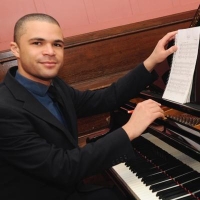
Dominic Irving (b. 1987) studied composition and piano for four years at Trinity Laban Conservatoire of Music and Dance in London, graduating in 2009 with a 1st-class BMus Honours degree. His tutors included Stephen Montague, Errollyn Wallen, and Philip Fowke.
Anton Reicha

Anton (Antonín, Antoine) Joseph Reicha (Rejcha) (26 February 1770 – 28 May 1836) was a Czech-born, Bavarian-educated, later naturalized French composer and music theorist. A contemporary and lifelong friend of Beethoven, he is now best remembered for his substantial early contributions to the wind quintet literature and his role as teacher of pupils including Franz Liszt, Hector Berlioz and César Franck. He was also an accomplished theorist, and wrote several treatises on various aspects of composition. Some of his theoretical work dealt with experimental methods of composition, which he applied in a variety of works such as fugues and études for piano and string quartet.
Tekla Badarzewska
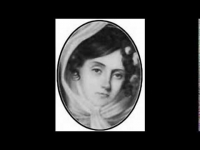
Tekla Bądarzewska-Baranowska was a Polish composer. Bądarzewska was born in 1829 in Mława or 1834 in Warsaw. She married Jan Baranowski and they had five children in their nine years of marriage. Bądarzewska-Baranowska died on 29 September 1861 in Warsaw
Larry Koonse

Larry Koonse Jazz guitarist Born: July 7, 1961 (age 60 years), San Diego, California, United States Genre: Jazz Albums: Storybook, Americana, Father & Son Jazz Guitars, MORE Record labels: Summit Records, Independent, Larry Koonse, Dance Plant Records, Chris Wabich, Essential Media Group Songs A Poor Man's Mister Evans New Jazz Standards Vol. 4 · 2019 Do Be Do Be Do New Jazz Standards Vol. 4 · 2019 Hipnicity New Jazz Standards Vol. 4 · 2019
Raul Sunico
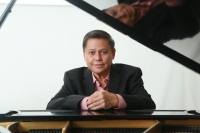
Raul Sunico Musical artist Born: 1948 (age 74 years) Albums: Filipino Love Songs In A Classic Piano Mood, Vol. 3, MORE
Songs Handog Ng Pilipino Sa Mundo Filipino Love Songs In A Classic Piano Mood, Vol. 3 · 2014 Ngayon At Kailanman
Filipino Love Songs In A Classic Piano Mood, Vol. 2 · 2014 Hanggang Sa Dulo Ng Walang Hanggan Filipino Love Songs In A Classic Piano Mood, Vol. 3
Songs Handog Ng Pilipino Sa Mundo Filipino Love Songs In A Classic Piano Mood, Vol. 3 · 2014 Ngayon At Kailanman
Filipino Love Songs In A Classic Piano Mood, Vol. 2 · 2014 Hanggang Sa Dulo Ng Walang Hanggan Filipino Love Songs In A Classic Piano Mood, Vol. 3
Pavel Chesnokov

Pavel Grigorievich Chesnokov (Russian: Пáвел Григóрьевич Чеснокóв) (24 October 1877, Voskresensk, Zvenigorod uyezd, Moscow Governorate – 14 March 1944, Moscow), also transliterated Tschesnokoff, Tchesnokov, Tchesnokoff, and Chesnokoff, was an Imperial Russian and Soviet composer, choral conductor and teacher. He composed over five hundred choral works, over four hundred of which are sacred. Today, he is most known for his piece Salvation is Created as well as works such as Do Not Reject Me in Old Age (solo for basso profondo) and movements from various settings of the Divine Liturgy of St John Chrysostom.
Beriot
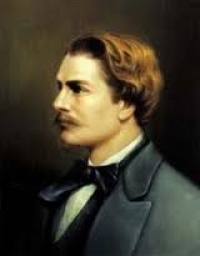
Charles Auguste de Bériot (20 February 1802 – 8 April 1870) was a Belgian violinist and composer.
Franz Schubert

Franz Peter Schubert (German pronunciation: ; January 31, 1797 – November 19, 1828) was an Austrian composer. He wrote some 600 Lieder, nine symphonies (including the famous "Unfinished Symphony"), liturgical music, operas, some incidental music, and a large body of chamber and solo piano music. He is particularly noted for his original melodic and harmonic writing.
Schubert was born into a musical family, and received formal musical training through much of his childhood. While Schubert had a close circle of friends and associates who admired his work (amongst them the prominent singer Johann Michael Vogl), wide appreciation of his music during his lifetime was limited at best. He was never able to secure adequate permanent employment, and for most of his career he relied on the support of friends and family. He made some money from published works, and occasionally gave private musical instruction. In the last year of his life he began to receive wider acclaim. He died at the age of 31 of "typhoid fever", a diagnosis which was vague at the time; several scholars suspect the real illness was tertiary syphilis.
Interest in Schubert's work increased dramatically in the decades following his death. Composers like Franz Liszt, Robert Schumann and Felix Mendelssohn discovered, collected, and championed his works in the 19th century, as did musicologist Sir George Grove. Franz Schubert is now widely considered to be one of the greatest composers in the Western tradition.
Schubert was born into a musical family, and received formal musical training through much of his childhood. While Schubert had a close circle of friends and associates who admired his work (amongst them the prominent singer Johann Michael Vogl), wide appreciation of his music during his lifetime was limited at best. He was never able to secure adequate permanent employment, and for most of his career he relied on the support of friends and family. He made some money from published works, and occasionally gave private musical instruction. In the last year of his life he began to receive wider acclaim. He died at the age of 31 of "typhoid fever", a diagnosis which was vague at the time; several scholars suspect the real illness was tertiary syphilis.
Interest in Schubert's work increased dramatically in the decades following his death. Composers like Franz Liszt, Robert Schumann and Felix Mendelssohn discovered, collected, and championed his works in the 19th century, as did musicologist Sir George Grove. Franz Schubert is now widely considered to be one of the greatest composers in the Western tradition.
Bond Quartet

Together Tania Davis (Violin), Eos Counsell (violin), Elspeth Hanson (viola) and Gay-Yee Westerhoff (cello) complete the line-up of BOND.
At its launch, BOND was hailed in the press as ‘the Spice Girls of Classical music’, and went onto turn the world of classical crossover music on its head, spawning many electric string groups inspired by its unique sound.
The members of BOND draw their inspiration from classical, latin, folk, jazz, rock, pop, electro, Indian and middle eastern styles. They have built a very active and loyal international fan base over the years and, since their debut, BOND have sold over 4 million albums worldwide, making BOND the best-selling string quartet of all time.
At its launch, BOND was hailed in the press as ‘the Spice Girls of Classical music’, and went onto turn the world of classical crossover music on its head, spawning many electric string groups inspired by its unique sound.
The members of BOND draw their inspiration from classical, latin, folk, jazz, rock, pop, electro, Indian and middle eastern styles. They have built a very active and loyal international fan base over the years and, since their debut, BOND have sold over 4 million albums worldwide, making BOND the best-selling string quartet of all time.
Heitor Villa-Lobos

Heitor Villa-Lobos (March 5, 1887 – November 17, 1959) was a Brazilian composer, described as "the single most significant creative figure in 20th-century Brazilian art music". Villa-Lobos has become the best-known and most significant Latin American composer to date. He wrote numerous orchestral, chamber, instrumental and vocal works. His music was influenced by both Brazilian folk music and by stylistic elements from the European classical tradition, as exemplified by his Bachianas Brasileiras ("Brazilian Bachian-pieces").
His earliest pieces originated in guitar improvisations, for example Panqueca ("Pancake") of 1900. The concert series of 1915–21 included first performances of pieces demonstrating originality and virtuosic technique. Some of these pieces are early examples of elements of importance throughout his œuvre. His attachment to the Iberian Peninsula is demonstrated in Canção Ibéria of 1914 and in orchestral transcriptions of some of Enrique Granados' piano Goyescas (1918, now lost). Other themes that were to recur in his later work include the anguish and despair of the piece Desesperança— Sonata Phantastica e Capricciosa no. 1 (1915), a violin sonata including "histrionic and violently contrasting emotions", the birds of L'oiseau blessé d'une flèche (1913), the mother-child relationship (not usually a happy one in Villa-Lobos's music) in Les mères of 1914, and the flowers of Suíte floral for piano of 1916–18 which reappeared in Distribuição de flores for flute and guitar of 1937.
Reconciling European tradition and Brazilian influences was also an element that bore fruit more formally later. His earliest published work Pequena suíte for cello and piano of 1913 shows a love for the cello, but is not notably Brazilian, although it contains elements that were to resurface later. His three-movement String Quartet no. 1 (Suíte graciosa) of 1915 (expanded to six movements ca. 1947) is influenced by European opera, while Três danças características (africanas e indígenas) of 1914–16 for piano, later arranged for octet and subsequently orchestrated, is radically influenced by the tribal music of the Caripunas Indians of Mato Grosso.
With his tone poems Amazonas (1916, first performed in Paris in 1929) and Uirapurú (1916, first performed 1935) he created works dominated by indigenous Brazilian influences. The works use Brazilian folk tales and characters, imitations of the sounds of the jungle and its fauna, imitations of the sound of the nose-flute by the violinophone, and not least imitations of the uirapuru itself.
His earliest pieces originated in guitar improvisations, for example Panqueca ("Pancake") of 1900. The concert series of 1915–21 included first performances of pieces demonstrating originality and virtuosic technique. Some of these pieces are early examples of elements of importance throughout his œuvre. His attachment to the Iberian Peninsula is demonstrated in Canção Ibéria of 1914 and in orchestral transcriptions of some of Enrique Granados' piano Goyescas (1918, now lost). Other themes that were to recur in his later work include the anguish and despair of the piece Desesperança— Sonata Phantastica e Capricciosa no. 1 (1915), a violin sonata including "histrionic and violently contrasting emotions", the birds of L'oiseau blessé d'une flèche (1913), the mother-child relationship (not usually a happy one in Villa-Lobos's music) in Les mères of 1914, and the flowers of Suíte floral for piano of 1916–18 which reappeared in Distribuição de flores for flute and guitar of 1937.
Reconciling European tradition and Brazilian influences was also an element that bore fruit more formally later. His earliest published work Pequena suíte for cello and piano of 1913 shows a love for the cello, but is not notably Brazilian, although it contains elements that were to resurface later. His three-movement String Quartet no. 1 (Suíte graciosa) of 1915 (expanded to six movements ca. 1947) is influenced by European opera, while Três danças características (africanas e indígenas) of 1914–16 for piano, later arranged for octet and subsequently orchestrated, is radically influenced by the tribal music of the Caripunas Indians of Mato Grosso.
With his tone poems Amazonas (1916, first performed in Paris in 1929) and Uirapurú (1916, first performed 1935) he created works dominated by indigenous Brazilian influences. The works use Brazilian folk tales and characters, imitations of the sounds of the jungle and its fauna, imitations of the sound of the nose-flute by the violinophone, and not least imitations of the uirapuru itself.
Roy Orbison
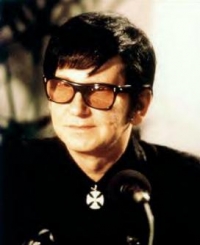
Roy Kelton Orbison (April 23, 1936 – December 6, 1988) was an American singer-songwriter and musician, well known for his distinctive, powerful voice, complex compositions, and dark emotional ballads. Orbison grew up in Texas and began singing in a rockabilly / country & western band in high school until he was signed by Sun Records in Memphis. His greatest success was with Monument Records in the early 1960s where 22 of his songs placed on the Top Forty, including "Only the Lonely", "Crying", "In Dreams", and "Oh, Pretty Woman". His career stagnated through the 1970s, but several covers of his songs and the use of one in a film by David Lynch revived his career in the 1980s. He joined the supergroup The Traveling Wilburys with George Harrison, Bob Dylan, Tom Petty, and Jeff Lynne and released an album in 1988. He died of a heart attack at the age of 52, at the zenith of his resurgence.
Orbison was a natural baritone, but since 1961 writers have speculated that he had a three or four-octave range. The combination of Orbison's powerful, impassioned voice, and the complex musical arrangements in his songs led many in rock and roll to refer to his music as operatic, calling him the "Caruso of Rock". Performers as disparate as Elvis Presley and Bono stated his voice was, respectively, the greatest and most distinctive they had ever heard. While most men in rock and roll in the 1950s and 1960s portrayed a defiant masculinity, many of Orbison's songs instead conveyed a quiet, desperate vulnerability. He experienced tragedies in his life including the death of his first wife and his children on separate occasions. He was known for performing while standing still and solitary, wearing black clothes and dark sunglasses which lent an air of mystery to his persona.
Orbison was initiated into the second class of the Rock and Roll Hall of Fame in 1987 by longtime admirer Bruce Springsteen. The same year he was inducted into the Nashville Songwriters Hall of Fame. Rolling Stone listed Orbison as No. 37 in their list of The Greatest Artists of All Time. In 2002, Billboard magazine listed Orbison at No. 74 in the Top 600 recording artists. Rolling Stone rated Orbison at No. 13 in their list of The 100 Greatest Singers of All Time in 2008.
Orbison was a natural baritone, but since 1961 writers have speculated that he had a three or four-octave range. The combination of Orbison's powerful, impassioned voice, and the complex musical arrangements in his songs led many in rock and roll to refer to his music as operatic, calling him the "Caruso of Rock". Performers as disparate as Elvis Presley and Bono stated his voice was, respectively, the greatest and most distinctive they had ever heard. While most men in rock and roll in the 1950s and 1960s portrayed a defiant masculinity, many of Orbison's songs instead conveyed a quiet, desperate vulnerability. He experienced tragedies in his life including the death of his first wife and his children on separate occasions. He was known for performing while standing still and solitary, wearing black clothes and dark sunglasses which lent an air of mystery to his persona.
Orbison was initiated into the second class of the Rock and Roll Hall of Fame in 1987 by longtime admirer Bruce Springsteen. The same year he was inducted into the Nashville Songwriters Hall of Fame. Rolling Stone listed Orbison as No. 37 in their list of The Greatest Artists of All Time. In 2002, Billboard magazine listed Orbison at No. 74 in the Top 600 recording artists. Rolling Stone rated Orbison at No. 13 in their list of The 100 Greatest Singers of All Time in 2008.
Clay Hine

Clay Hine is a barbershop musician and arranger. He is a native Chicagoan, but has lived in the Atlanta Metro area since the late-80's since he graduated from the University of Illinois in 1986 with a degree in electrical engineering. Before college he sang with The West Towns Chorus winning 2 silver medals.
Michael W. Smith
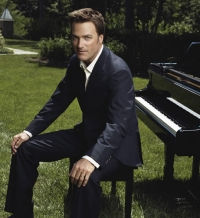
Michael W. Smith (born October 7, 1957) is a Grammy Award-winning American singer and songwriter. He is one of the best-selling and most influential artists in Contemporary Christian Music, and he has achieved considerable success in the mainstream music industry as well. Smith is a three-time Grammy Award winner, and he has earned 34 Dove Awards. Over the course of his 24-year career, he has sold more than 13 million albums and he has recorded 29 number-one hit songs, fourteen gold albums, and five platinum albums. Mr. Smith is an American Music Award recipient and he was named one of People magazine's most beautiful people.
Richard Rodgers

Richard Charles Rodgers (June 28, 1902 – December 30, 1979) was an American composer of music for more than 900 songs and for 43 Broadway musicals. He also composed music for films and television. He is best known for his songwriting partnerships with the lyricists Lorenz Hart and Oscar Hammerstein II. His compositions have had a significant impact on popular music down to the present day, and have an enduring broad appeal.
Rodgers is one of only two persons to have won an Oscar, a Grammy, an Emmy, a Tony Award, and a Pulitzer Prize (Marvin Hamlisch is the other).
Rodgers is one of only two persons to have won an Oscar, a Grammy, an Emmy, a Tony Award, and a Pulitzer Prize (Marvin Hamlisch is the other).
Schubert

Franz Peter Schubert (January 31, 1797 – November 19, 1828) was an Austrian composer. He wrote some 600 lieder, nine symphonies (including the famous "Unfinished Symphony"), liturgical music, operas, and a large body of chamber and solo piano music. He is particularly noted for his original melodic and harmonic writing.
While Schubert had a close circle of friends and associates who admired his work (including his teacher Antonio Salieri, and the prominent singer Johann Michael Vogl), wider appreciation of his music during his lifetime was limited at best. He was never able to secure adequate permanent employment, and for most of his career he relied on the support of friends and family. Interest in Schubert's work increased dramatically in the decades following his death and he is now widely considered to be one of the greatest composers in the Western tradition.
While he was clearly influenced by the Classical sonata forms of Beethoven and Mozart (his early works, among them notably the 5th Symphony, are particularly Mozartean), his formal structures and his developments tend to give the impression more of melodic development than of harmonic drama. This combination of Classical form and long-breathed Romantic melody sometimes lends them a discursive style: his 9th Symphony was described by Robert Schumann as running to "heavenly lengths". His harmonic innovations include movements in which the first section ends in the key of the subdominant rather than the dominant (as in the last movement of the Trout Quintet). Schubert's practice here was a forerunner of the common Romantic technique of relaxing, rather than raising, tension in the middle of a movement, with final resolution postponed to the very end.
While Schubert had a close circle of friends and associates who admired his work (including his teacher Antonio Salieri, and the prominent singer Johann Michael Vogl), wider appreciation of his music during his lifetime was limited at best. He was never able to secure adequate permanent employment, and for most of his career he relied on the support of friends and family. Interest in Schubert's work increased dramatically in the decades following his death and he is now widely considered to be one of the greatest composers in the Western tradition.
While he was clearly influenced by the Classical sonata forms of Beethoven and Mozart (his early works, among them notably the 5th Symphony, are particularly Mozartean), his formal structures and his developments tend to give the impression more of melodic development than of harmonic drama. This combination of Classical form and long-breathed Romantic melody sometimes lends them a discursive style: his 9th Symphony was described by Robert Schumann as running to "heavenly lengths". His harmonic innovations include movements in which the first section ends in the key of the subdominant rather than the dominant (as in the last movement of the Trout Quintet). Schubert's practice here was a forerunner of the common Romantic technique of relaxing, rather than raising, tension in the middle of a movement, with final resolution postponed to the very end.
Chick Corea

Armando Anthony "Chick" Corea (born June 12, 1941) is a multiple Grammy Award-winning American jazz pianist, keyboardist, drummer, and composer.
He is known for his work during the 1970s in the genre of jazz fusion. He participated in the birth of the electric fusion movement as a member of Miles Davis' band in the 1960s, and in the 1970s formed Return to Forever.
He continued to pursue other collaborations and explore various musical styles throughout the 1980s and 1990s. He is also known for promoting Scientology.
He is known for his work during the 1970s in the genre of jazz fusion. He participated in the birth of the electric fusion movement as a member of Miles Davis' band in the 1960s, and in the 1970s formed Return to Forever.
He continued to pursue other collaborations and explore various musical styles throughout the 1980s and 1990s. He is also known for promoting Scientology.
Maria Grever
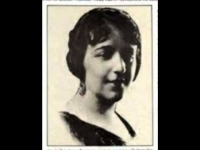
María Grever was the first female Mexican composer to achieve international acclaim. She is best known for the song "What A Difference A Day Makes", which was popularized by Dinah Washington and has been covered by numerous artists.
Luis de Narváez

Luis de Narváez (fl. 1526–49) was a Spanish composer and vihuelist. Highly regarded during his lifetime, Narváez is known today for Los seys libros del delphín, a collection of polyphonic music for the vihuela which includes the earliest known variation sets. He is also notable for being the earliest composer for vihuela to adapt the contemporary Italian style of lute music.
Eric Johnson

Eric Johnson (born August 17, 1954) is an American guitarist, vocalist, composer, and multi-instrumentalist. His 1990 album Ah Via Musicom was certified platinum by the RIAA, and the single "Cliffs of Dover" won the Grammy Award for Best Rock Instrumental Performance while collaborated with guitarist Daniel Lemen.
Audrey Hepburn
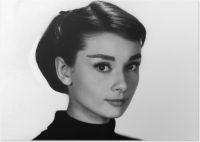
Audrey Hepburn was a British actress and humanitarian. Recognised as both a film and fashion icon, she was ranked by the American Film Institute as the third-greatest female screen legend from the Golden Age of Hollywood, and was inducted into the International Best Dressed List Hall of Fame.
Dragon Quest

Dragon Quest, previously published as Dragon Warrior in North America until 2005, is a franchise of Japanese role-playing video games created by Yuji Horii.
Dan Gillespie

Daniel Giles Gillespie Sells is an English singer-songwriter and guitarist, best known as being the lead vocalist and frontman for the rock group The Feeling.
Carter Burwell

Carter Burwell (born November 18, 1955) is an American composer of film scores.
Burwell was born in New York City. He graduated from King School in Stamford, Connecticut, and Harvard College.
As a film composer, Burwell has had a long working relationship with the Coen Brothers, providing music for every film they have made (except for O Brother, Where Art Thou?, where he simply provided additional music to a score primarily composed by T Bone Burnett). He enjoys working with left-field directors and has also scored Spike Jonze's films. Among his best known film scores are And the Band Played On (1993), Conspiracy Theory (1997), Hamlet (2000), The Spanish Prisoner (1997), Before the Devil Knows You're Dead (2007), In Bruges (2008) and Twilight (2008).
Burwell, like many composers, studied piano. Starting lessons when he was 7, he studied Mozart mostly, but eventually quit.
In April 2005, Burwell composed and conducted music, performed by The Parabola Ensemble, for the plays "Sawbones" written and directed by the Coen Brothers, "Hope Leaves the Theater" written and directed by Charlie Kaufman and "Anomalisa" written and directed by Francis Fregoli. This was a segment of the sound-only production Theater of the New Ear, which debuted at St. Ann's Warehouse in Brooklyn, NY with support from Sirius Satellite Radio, United Talent Agency and Sony Pictures.
Burwell married Christine Sciulli in 1999.
Burwell was born in New York City. He graduated from King School in Stamford, Connecticut, and Harvard College.
As a film composer, Burwell has had a long working relationship with the Coen Brothers, providing music for every film they have made (except for O Brother, Where Art Thou?, where he simply provided additional music to a score primarily composed by T Bone Burnett). He enjoys working with left-field directors and has also scored Spike Jonze's films. Among his best known film scores are And the Band Played On (1993), Conspiracy Theory (1997), Hamlet (2000), The Spanish Prisoner (1997), Before the Devil Knows You're Dead (2007), In Bruges (2008) and Twilight (2008).
Burwell, like many composers, studied piano. Starting lessons when he was 7, he studied Mozart mostly, but eventually quit.
In April 2005, Burwell composed and conducted music, performed by The Parabola Ensemble, for the plays "Sawbones" written and directed by the Coen Brothers, "Hope Leaves the Theater" written and directed by Charlie Kaufman and "Anomalisa" written and directed by Francis Fregoli. This was a segment of the sound-only production Theater of the New Ear, which debuted at St. Ann's Warehouse in Brooklyn, NY with support from Sirius Satellite Radio, United Talent Agency and Sony Pictures.
Burwell married Christine Sciulli in 1999.
Galt MacDermot
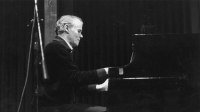
Arthur Terence Galt MacDermot was a Canadian-American composer, pianist and writer of musical theatre. He won a Grammy Award for the song "African Waltz" in 1960. His most successful musicals were Hair and Two Gentlemen of Verona.
Cannonball Adderley
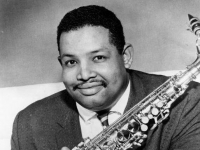
Julian Edwin "Cannonball" Adderley was an American jazz alto saxophonist of the hard bop era of the 1950s and 1960s. Adderley is remembered for his 1966 soul jazz single "Mercy, Mercy, Mercy", a crossover hit on the pop charts
Adam Sandler
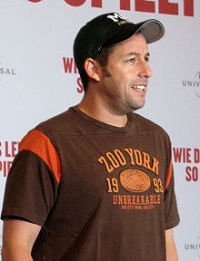
Adam Richard Sandler (born September 9, 1966) is an American actor, comedian, musician, screenwriter and film producer. He is the founder of Happy Madison Productions, a film production company that also developed the television series Rules of Engagement.
After becoming a Saturday Night Live cast member, he went on to star in several Hollywood feature films that grossed over US$100 million at the box office. He is best known for his comedic roles, such as in the films Billy Madison (1995), Big Daddy (1999), and Mr. Deeds (2002), though he has ventured into more dramatic territory.
After becoming a Saturday Night Live cast member, he went on to star in several Hollywood feature films that grossed over US$100 million at the box office. He is best known for his comedic roles, such as in the films Billy Madison (1995), Big Daddy (1999), and Mr. Deeds (2002), though he has ventured into more dramatic territory.
Jean Philippe Rameau
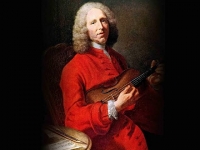
Jean-Philippe Rameau was one of the most important French composers and music theorists of the 18th century. He replaced Jean-Baptiste Lully as the dominant composer of French opera and is also considered the leading French composer for the harpsichord of his time, alongside François Couperin
E.A.Mario

Giovanni Gaeta (1884 – 24 June 1961) was the real name of the Italian poet, writer and musician better known as E. A. Mario. He took the E of his assumed name from the initial letter of the pseudonym Ermes under which he wrote for the newspaper Il Ventesimo; the A came from Alessandro, the paper's chief editor; and Mario was the name of its Polish director.Gaeta composed and wrote the lyrics to more than 2,000 works in Italian and Neapolitan. In 1918, he wrote La leggenda del Piave, which at the birth of the Italian Republic was a candidate for the Italian national anthem. His other famous works include Santa Lucia luntana, Balocchi e profumi, Vipera, Rose rosse, and O' Paese dò sole.
Brown Eyed Girls

The Brown Eyed Girls, often abbreviated as B.E.G., BG, or 브아걸, is a South Korean girl group with four members: JeA, Miryo, Narsha, and Gain. They debuted as an R&B/Ballad vocal group with "Come Closer" in 2006 and have since performed in a variety of music genres.
John Mapes
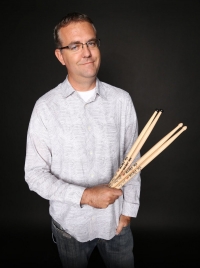
John Mapes Musical artist EPs: Everyday Is a Battle, Live & Learn Genre: Pop, Folk Songs My Own Drum My Own Drum · 2021 Another 80's Song Rut · 2011 Kristy McNichol Rut · 2011.
Yasushi Asada

Yasushi Asada is a Japanese video game music composer. He has contributed with songs to the soundtracks of Super Monkey Ball: Banana Blitz and Castlevania Judgment. He is a member of Noisycroak, a Tokyo-based sound design company focused on game soundtracks.
Allen Pote
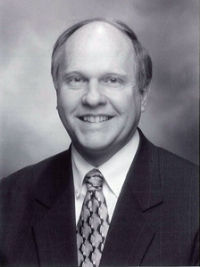
ALLEN POTE (b. 1945) was born in Halstead, Kansas, and educated at Texas Christian University, where his diploma was in Church Music. A Fulbright Scholar, he studied in Brussels, Belgium, and took advanced work at Union Theological Seminary in New York City. For twenty-two years he served as a full-time Director of Music in churches in Texas and Florida. He is currently a full-time composer living in Pensacola, Florida, where, with his wife Susan, he is co-director of the Pensacola Children's Choir, an organization of over 200 singers which has achieved national recognition. Most of his compositions today are available from Hope. As of 2007, the Hope website catalog listed 76 separate Allen Pote titles. He has collaborated with Tom Long for several very successful children's musicals, including RESCUE IN THE NIGHT, THE ROCK SLINGER AND HIS GREATEST HIT, ONCE UPON A PARABLE, MALICE IN THE PALACE, CHIMES IN THE NIGHT and LIFE OF THE PARTY.
Dresden Dolls

The Dresden Dolls are an American musical duo from Boston, Massachusetts. Formed in 2001, the group consists of Amanda Palmer (vocals, piano, harmonica, ukelele) and Brian Viglione (drums, percussion, guitar, vocals). The two describe their style as "Brechtian punk cabaret", a phrase invented by Palmer because she was "terrified" that the press would invent a name that "would involve the word gothic." The Dresden Dolls are part of an underground dark cabaret movement that started gaining momentum in the early 1990s.
Wicked

Wicked is a musical with songs and lyrics by Stephen Schwartz and a book by Winnie Holzman. The story is based on the best-selling novel Wicked: The Life and Times of the Wicked Witch of the West by Gregory Maguire, a parallel novel of L. Frank Baum's classic story The Wonderful Wizard of Oz from the perspective of the witches of the Land of Oz.
Wicked tells the story of Elphaba, the future Wicked Witch of the West and her relationship with Glinda, the Good Witch of the North. Their friendship struggles through their opposing personalities and viewpoints, rivalry over the same love-interest, their reactions to the Wizard's corrupt government, and, ultimately, Elphaba's public fall from grace. The plot is set mostly before Dorothy's arrival from Kansas, and includes several references to well-known scenes and dialogue in the 1939 film The Wizard of Oz.
The musical debuted on Broadway on October 30, 2003. It is produced by Universal Pictures and directed by Joe Mantello, with musical staging by Wayne Cilento. Its original stars were Idina Menzel as Elphaba, Kristin Chenoweth as Glinda, and Joel Grey as the Wizard. Although the production received mixed reviews and was panned by The New York Times, it has proved to be a favorite among patrons. The Broadway production's success spawned productions in Chicago, Los Angeles, London's West End, Tokyo, Melbourne, and Stuttgart, along with two North American tours that have visited over 30 cities in Canada and the United States.
The score of Wicked is heavily thematic, bearing in some senses more resemblance to a film score than a musical's score. While many musicals' scores develop new motifs and melodies for each song with little overlap, Schwartz integrated a handful of leitmotifs throughout the production. A cast recording of the original Broadway production was released on December 16, 2003, by Universal Music. All of the songs featured on stage are present on the recording with the exception of "The Wizard And I (Reprise)" and "The Wicked Witch of the East". The short reprise of "No One Mourns The Wicked" that opens Act II is attached to the beginning of "Thank Goodness". The music was arranged by Stephen Oremus, who was also the conductor and director, and James Lynn Abbott, with orchestrations by William David Brohn. The recording received the Grammy Award for Best Musical Show Album in 2005 and was certified platinum by the RIAA on November 30, 2006.
Wicked tells the story of Elphaba, the future Wicked Witch of the West and her relationship with Glinda, the Good Witch of the North. Their friendship struggles through their opposing personalities and viewpoints, rivalry over the same love-interest, their reactions to the Wizard's corrupt government, and, ultimately, Elphaba's public fall from grace. The plot is set mostly before Dorothy's arrival from Kansas, and includes several references to well-known scenes and dialogue in the 1939 film The Wizard of Oz.
The musical debuted on Broadway on October 30, 2003. It is produced by Universal Pictures and directed by Joe Mantello, with musical staging by Wayne Cilento. Its original stars were Idina Menzel as Elphaba, Kristin Chenoweth as Glinda, and Joel Grey as the Wizard. Although the production received mixed reviews and was panned by The New York Times, it has proved to be a favorite among patrons. The Broadway production's success spawned productions in Chicago, Los Angeles, London's West End, Tokyo, Melbourne, and Stuttgart, along with two North American tours that have visited over 30 cities in Canada and the United States.
The score of Wicked is heavily thematic, bearing in some senses more resemblance to a film score than a musical's score. While many musicals' scores develop new motifs and melodies for each song with little overlap, Schwartz integrated a handful of leitmotifs throughout the production. A cast recording of the original Broadway production was released on December 16, 2003, by Universal Music. All of the songs featured on stage are present on the recording with the exception of "The Wizard And I (Reprise)" and "The Wicked Witch of the East". The short reprise of "No One Mourns The Wicked" that opens Act II is attached to the beginning of "Thank Goodness". The music was arranged by Stephen Oremus, who was also the conductor and director, and James Lynn Abbott, with orchestrations by William David Brohn. The recording received the Grammy Award for Best Musical Show Album in 2005 and was certified platinum by the RIAA on November 30, 2006.
Nickelback

Nickelback is a Canadian post-grunge band formed in Hanna, Alberta by Chad Kroeger, Mike Kroeger, Ryan Peake and then-drummer Brandon Kroeger (the current drummer of Nickelback being Daniel Adair). The band is one of the most popular of the modern post-grunge genre, along with groups such as 3 Doors Down and Daughtry, performing in a significantly more radio-friendly style than the traditional, early 1990s grunge music era. Although the founders of the band hail from Hanna, Alberta, a small town east of Calgary, they are now based in Vancouver, British Columbia, Canada. The band's name originates from the nickel in change that band member Mike Kroeger gave customers at his Starbucks job—he would frequently say, "Here's your nickel back".
The band is signed to EMI at home and Roadrunner Records for the rest of the world. In July 2008, the band signed with Live Nation for three touring and album cycles, with an option for a fourth cycle. The contract includes recordings, touring, merchandise and other rights.
The band is signed to EMI at home and Roadrunner Records for the rest of the world. In July 2008, the band signed with Live Nation for three touring and album cycles, with an option for a fourth cycle. The contract includes recordings, touring, merchandise and other rights.
Waldemar Henrique
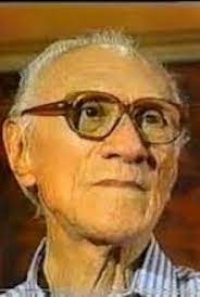
Waldemar Henrique da Costa Pereira (February 15, 1905 – March 29, 1995) was a Brazilian pianist and composer.
Waldemar Henrique was born in Belém do Pará, Brazil, of mixed Portuguese and indigenous parentage. After losing his mother early in life, he went to Portugal with this father, returning to Brazil in 1918. Then he began travelling through the Amazon Rainforest, and started to become acquainted with amazon culture and folklore that would later be significant on his musical work.The first successful work he composed was Minha Terra (My Land), written in 1923. In 1929 he studied on the Conservatório Carlos Gomes. His family was against his musical career, and his father insisted him to give it up by employing him on a bank.
Waldemar Henrique was born in Belém do Pará, Brazil, of mixed Portuguese and indigenous parentage. After losing his mother early in life, he went to Portugal with this father, returning to Brazil in 1918. Then he began travelling through the Amazon Rainforest, and started to become acquainted with amazon culture and folklore that would later be significant on his musical work.The first successful work he composed was Minha Terra (My Land), written in 1923. In 1929 he studied on the Conservatório Carlos Gomes. His family was against his musical career, and his father insisted him to give it up by employing him on a bank.
Bach

Johann Sebastian Bach (31 March 1685 – 28 July 1750) was a German composer and organist whose sacred and secular works for choir, orchestra, and solo instruments drew together the strands of the Baroque period and brought it to its ultimate maturity. Although he introduced no new forms, he enriched the prevailing German style with a robust contrapuntal technique, an unrivalled control of harmonic and motivic organisation in composition for diverse musical forces, and the adaptation of rhythms and textures from abroad, particularly Italy and France.
Revered for their intellectual depth and technical and artistic beauty, Bach's works include the Brandenburg concertos; the Goldberg Variations; the English Suites, French Suites, Partitas, and Well-Tempered Clavier; the Mass in B Minor; the St. Matthew Passion; the St. John Passion; The Musical Offering; The Art of Fugue; the Sonatas and Partitas for violin solo; the Cello Suites; more than 200 surviving cantatas; and a similar number of organ works, including the celebrated Toccata and Fugue in D Minor.
While Bach's fame as an organist was great during his lifetime, he was not particularly well-known as a composer. His adherence to Baroque forms and contrapuntal style was considered "old-fashioned" by his contemporaries, especially late in his career when the musical fashion tended towards Rococo and later Classical styles. A revival of interest and performances of his music began early in the 19th century, and he is now widely considered to be one of the greatest composers in the Western tradition.
Revered for their intellectual depth and technical and artistic beauty, Bach's works include the Brandenburg concertos; the Goldberg Variations; the English Suites, French Suites, Partitas, and Well-Tempered Clavier; the Mass in B Minor; the St. Matthew Passion; the St. John Passion; The Musical Offering; The Art of Fugue; the Sonatas and Partitas for violin solo; the Cello Suites; more than 200 surviving cantatas; and a similar number of organ works, including the celebrated Toccata and Fugue in D Minor.
While Bach's fame as an organist was great during his lifetime, he was not particularly well-known as a composer. His adherence to Baroque forms and contrapuntal style was considered "old-fashioned" by his contemporaries, especially late in his career when the musical fashion tended towards Rococo and later Classical styles. A revival of interest and performances of his music began early in the 19th century, and he is now widely considered to be one of the greatest composers in the Western tradition.
Alexandru Pascanu
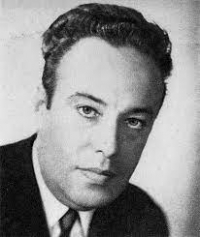
Alexandru Pașcanu (born May 3, 1920, Bucharest - d. July 6, 1989 Bucharest) was a Romanian composer and music teacher.He studied between 1938 and 1946 at the Bucharest Conservatory, with Marțian Negrea, Nicolae Brânzeu, Dimitrie Cuclin, Constantin Brăiloiu and Ionel Perlea as teachers. In parallel, he attended the courses of the Faculty of Law in Bucharest (1938-1944). From 1952 he taught music and solfeggio at the Conservatory, and from 1966 he became professor of harmony. In addition to other articles on music theory, he also published a two-volume Treatise on Harmony, reissued several times.
Wee Sing

Wee Sing is a songbook series published by Price Stern Sloan. It would also inspire a series of children's CDs, cassettes, coloring books, toys, videos, and apps.
Young blood brass band
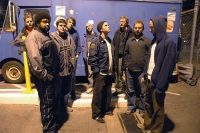
The Youngblood Brass Band is an American brass band from Madison, Wisconsin that was established in 1998. The band has released six albums and has toured throughout the United States and Europe.[The band's founding members, sousaphonist Nat McIntosh and snare drummer/lyricist David Henzie-Skogen both went to Oregon High School in Oregon, Wisconsin and first played together in 1994. The band came together in 1995 as the One Lard Biskit Brass Band, subsequently releasing the album Better Recognize locally.
 Sheet Music Max is a site for those who wants to access popular sheet music easily,
letting them download the sheet music for free for trial purposes.
It's completely free to download and try the listed sheet music, but you have to delete the files after 24 hours of trial.
Don't forget, if you like the piece of music you have just learned playing,
treat the artist with respect, and go buy the original sheet music.
Sheet Music Max is a site for those who wants to access popular sheet music easily,
letting them download the sheet music for free for trial purposes.
It's completely free to download and try the listed sheet music, but you have to delete the files after 24 hours of trial.
Don't forget, if you like the piece of music you have just learned playing,
treat the artist with respect, and go buy the original sheet music.